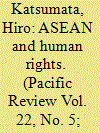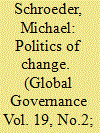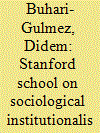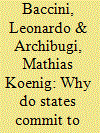|
|
|
Sort Order |
|
|
|
Items / Page
|
|
|
|
|
|
|
| Srl | Item |
| 1 |
ID:
131507


|
|
|
|
|
| Publication |
2014.
|
| Summary/Abstract |
Two parallel norms mandate an international duty to hold state leaders individually accountable for serious corruption and human rights crimes. The development of these new norms is poorly explained by realist and neoliberal perspectives, but there are also weaknesses in recent constructivist explanations of norm diffusion that emphasize agency at the expense of structure. Such approaches have difficulty explaining the source of and similarities between new norms, and treat norm entrepreneurs as prior to and separate from their environment. In contrast, drawing on sociological institutionalism, we present a more structural explanation of individual accountability norms. The norms derive from an overarching modernist world culture privileging individual rights and responsibilities, as well as rational-legal authority. This culture is more generative of norm entrepreneurs than generated by them. The specific norms are instantiated through a process of "theorization" within permissive post-Cold War conditions, and diffused via mimicry, professionalization, and coercive isomorphism
|
|
|
|
|
|
|
|
|
|
|
|
|
|
|
|
| 2 |
ID:
092136


|
|
|
|
|
| Publication |
2009.
|
| Summary/Abstract |
Observers of Southeast Asian affairs commonly assume that the members of the Association of Southeast Asian Nations (ASEAN) are reluctant to pursue liberal agendas, and that their main concern is to resist pressure from Western powers to improve their human rights practice. This article, however, argues that such a conventional view is too simplistic. The Southeast Asian countries have voluntarily been pursuing liberal agendas, and their main concern here is to be identified as 'Western' countries - advanced countries with legitimate international status. They have 'mimetically' been adopting the norm of human rights which is championed by the advanced industrialized democracies, with the intention of securing ASEAN's identity as a legitimate institution in the community of modern states. Ultimately, they have been pursuing liberal agendas, for the same reason as cash-strapped developing countries have luxurious national airlines and newly-independent countries institute national flags. Yet it should be noted that the progress of ASEAN's liberal reform has been modest. A conventional strategy for facilitating this reform would be to put more pressure on the members of ASEAN; however, the usefulness of such a strategy is diminishing. The development of an East Asian community, the core component of which is the ASEAN-China concord, makes it difficult for the Western powers to exercise influence over the Southeast Asian countries. Hence, as an alternative strategy, this article proposes that ASEAN's external partners should 'globalize' the issue of its liberal reform, by openly assessing its human rights record in global settings, with the aim of boosting the concern of its members for ASEAN's international standing.
|
|
|
|
|
|
|
|
|
|
|
|
|
|
|
|
| 3 |
ID:
121426


|
|
|
|
|
| Publication |
2013.
|
| Summary/Abstract |
The United Nations and many members were unenthusiastic when Nicaragua, a sovereign state, invited the UN to observe its elections in 1989. However, the UN accepted the invitation, and UN electoral services have since reached over 100 members. This article investigates UN involvement in elections from 1989 to 2006 and identifies important changes over that time in the kinds of electoral services that the UN provided. These changes cannot be explained solely by shifts in member interests, international norms, the distribution of power, or the market for electoral services. Instead, the UN made modest reforms to manage the conflicting pressures that these external shifts produced without stretching scarce resources or weakening its perceived legitimacy. However, each modest reform-an exception, symbolic institutional change, or new leadership vision-triggered additional changes by reconstituting member or bureaucratic preferences. This article specifically highlights three change processes that these reforms triggered: normalizing deviance, expanding demand, and offering political cover. These findings have important implications for scholarship on UN reform, the provision of electoral services, and the role of the UN's leadership.
|
|
|
|
|
|
|
|
|
|
|
|
|
|
|
|
| 4 |
ID:
099498


|
|
|
|
|
| Publication |
2010.
|
| Summary/Abstract |
Stanford School-World Society or World Polity approach-led by John W. Meyer has been largely overlooked despite its revolutionary insights (Robertson 2009). Nevertheless, renewed interest in neoinstitutionalisms and concepts as world society, culture, and legitimacy (Clark 2007) imply Stanford School's relevance for contemporary social and political sciences. This essay discusses first, the underlying theoretical arguments of the School, second, its main findings and responses to criticisms, and third, Stanford School's resonance with the Constructivist, Neoinstitutionalist, and Sociological turns in International Relations. Finally, it suggests that Stanford School opens new horizons for EU studies by establishing the "missing link" between globalization and European integration.
|
|
|
|
|
|
|
|
|
|
|
|
|
|
|
|
| 5 |
ID:
132507


|
|
|
|
|
| Publication |
2014.
|
| Summary/Abstract |
Ratifying core conventions adopted by the International Labor Organization (ILO) creates legal obligations to improve labor standards in the domestic economy, notably with regard to union rights, minimum age and discrimination in employment, and forced labor. Why and when do states choose to ratify them? Two influential theoretical approaches lead to the expectation that states are influenced by the ratification behavior of other states. Drawing on rationalist institutionalism, the authors expect states to use institutions such as the ILO to improve or consolidate their preferred standards domestically while reducing the risk of suffering competitive disadvantages in world markets. In this view, ILO conventions are devices for the prevention and mitigation of regulatory races to the bottom among trade rivals. Drawing on sociological institutionalism, they expect states to ratify ILO conventions if doing so conforms to a norm of appropriate behavior that is prevalent in a state's peer groups. This article develops observable implications of these hypotheses and tests them by applying spatial regression models to seven core ILO conventions and 187 countries between 1948 and 2009. The analysis yields strong evidence in support of both hypotheses.
|
|
|
|
|
|
|
|
|
|
|
|
|
|
|
|
|
|
|
|
|